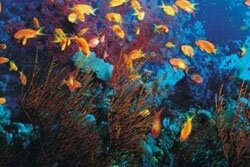 |

Saving The Coral Reefs: The things you can do!
Recent developments in scientific findings have concluded that our marine eco-systems are under siege by an array of man-made inflictions. Here are just a few things you can do at home, at work, at the beach or in the water:
At Home:
? Don't purchase items made from coral or other threatened marine life.
? Don't purchase dietary supplements or other products that are made from threatened wildlife, like shark cartilage.
? Don't order turtle, shark fin or other restaurant dishes made from threatened wildlife.
? Make sure the tuna you purchase (fresh or canned) has been caught using dolphin-safe techniques. If it doesn't say so on the can or packaging, don't buy it!
? Don't eat at "live-fish" restaurants where the fish may have been captured using cyanide.
? Educate yourself about the source of the seafood you choose to eat. Prawn farms can lead to the destruction of mangroves, and shrimp are often collected by dragging nets, which kill all the marine life in their path. Turtles are frequently drowned when they get caught in shrimp nets without, or with mal-functioning, TEDs (turtle excluder devices). On average, 10 pounds of fish are wasted for each pound of shrimp gathered.
? Don't purchase tropical wood furniture or products that may come from clear-cut tropical forests.
? Don't purchase gas-filled balloons that can find their way into the sea, rivers and lakes, and suffocate birds, fish, mammals and coral.
? Join a beach clean-up. Encourage others to join ? form a group to participate together.
? Purchase cleaning aids that are biodegradable and environment friendly.
? Buy in bulk to reduce your waste.
At Work:
? Tell your employer of your interest and try to promote the company's involvement, especially if business in any way touches the environment.
? Encourage the purchase and use of recycled paper and plastics, and promote as much recycling as possible in your company's processes.
? Use both sides of all paper. Make notepads out of waste paper.
? Re-use envelops with a label.
If You Own A Tropical Aquarium:
? Don't purchase fish caught using cyanide or other poisons.
? Don't purchase coral pieces or "live rock" for your tank unless there is proof that they were cultured (grown for sale, not taken in the wild).
? Tell your local aquarium or pet shop that you will not buy from them unless they stock only products that do not destroy the marine environment.
? Better yet, marine life is best appreciated in its natural habitat, DON?T OWN A TROPICAL AQUARIUM!
By The Sea:
? Don't purchase coral souvenirs.
? Don't purchase coral jewelry - some coral is considered a semi-precious substance, but it's even more precious in its natural habitat.
? Support marine protected areas such as Marine Parks.
? Donate time or money to coral reef conservation efforts.
? Don't order turtle, shark fin or other restaurant dishes made from threatened wildlife.
? Avoid "live-fish" restaurants where the fish may have been captured using cyanide.
? Don?t throw plastic bags, cups, caps, bottles or cigarette butts into the oceans. These could accidentally be swallowed by turtles or other marine life and choke or kill them slowly.
Diving or Snorkeling:
? Don't touch, stand on or collect coral.
? Respect local regulations about capturing, feeding and handling of marine life. If in doubt, don't touch it.
? Maintain control of fins, gauges and other equipment so they do not bump against the reef.
? Become expert in personal buoyancy control.
? If you spear-fish or hunt, take only what you intend to eat yourself.
? Practice diving in a pool or sandy area before diving near a reef. Get trained by experts so that you can understand and enjoy your dives more.
? Report all damage to coral reefs to dive operators and scientific and conservation groups that monitor coral reef health.
Some contents taken from:
http://home.earthlink.net/~fpearce/scuba/oneperson.html
|















